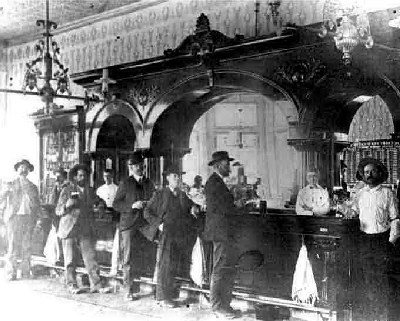| home
Wild Women of the West | Mattie Earp and the Dancehall girls | Annie Oakley and Calamity Jane | An Apache Woman's Tale | The Saga of Pearl Hart
Mattie Earp and the Dancehall girls
Mattie Blaylock was a farm girl from Iowa with large bones and a fine face. Not long after going West, she was working in Dodge City as a dance hall girl. She did okay, but like most girls on the line she wanted to find the right guy and leave that way of life. She met a local police officer and moved in with him. She was happy to be off the streets. He soon tired of the low pay of police work and became a bartender, gambling on the side. He bought Mattie a mine with his winnings and named it "The Mattie Blaylock."
They traveled together as man and wife, following the gambling circuit. It was good for quite a while, but then things went south in their relationship, and he left her for another woman. He never even said goodbye; he just left town. Mattie tried to make it on her own, but there was little she knew how to do. She went back on the line, and things went downhill from there. Mattie was older now and lacked the appeal of the younger girls. She woke up one morning in a small shack in a one-horse town with a stranger in her bed. Mattie ordered a bottle of laudanum, drank it all down and went to her final sleep.
At the inquest, the coroner in Pinal, Arizona Territory, asked a laborer named T.J. Flannery if he knew the deceased. He replied he did. She had told him her name was "Mattie Earp."
"Did you hear the deceased threaten her own life?" the coroner asked.
"I have," the witness answered. "[Wyatt] Earp, she said, had wrecked her life by deserting her and she didn't want to live."
Invasion of the Women of Easy Virtue
Like their male counterparts on the frontier, the early female arrivals were rugged individualists who angled west to gain the cherished privilege of being left alone to do what they pleased. And often as not, "doing what they pleased" was a nice way of saying they were women of easy virtue. A Forty-Niner's poem sums up the early arrivals to California:
The miners came in '49,
The whores in '51,
And when they got together
They produced the native son.
Many women who came West were trying to escape their past. Others saw too many restrictions in Eastern society and wanted to create a future in this new land of opportunity. All were hoping against hope, and many had nothing to lose.
Mattie Silks claimed she had never been a prostitute yet bragged that she was the youngest madame in the West. At the tender age of 19, she probably was the youngest successful madame that Denver had yet known. But Mattie was not alone in her profession. A Denver man described the scene on Holladay Street, where most of the Cyprians roosted: "Men took their liquor neat and women took what they could get their hands on." One of Denver's most successful madames in the 1880s was Jennie Rogers. When she caught her lover, Jack Wood, in the arms of another woman, Jennie shot him. She said she shot him because she loved him, and sure enough, when Jack recovered, she married him.
When off the ranges of the Southwest, the lonely cowboys lined up whenever they had the chance. Working hours were usually noon until dawn. Each girl had one day off a week, and a popular girl in a popular house earned as much as $200 a week. It was the custom in most of the cheaper establishments that while a man dallied, he was not permitted to remove any of his clothing except his hat.
Most Western males, with or without their hats on, were not inclined to look down their noses at the girls on the line. A Dodge City "old-timer" describing a favored "tid bit" recalled that "the only thing anyone could hold against her was her after-dark profession, and by Godfrey, I allow she elevated that considerably." A miner described Rosa May of Bodie, Calif., by declaring, "She was a gal who had a smile you'd go to hell for, and never regret it."
Although prostitution was condoned and even sanctioned in the early West, it simply could not interfere with business. In 1860, Madame Mary Miller spent three months in jail for "depressing real estate values." And, though the miners and cowboys "loved their gals," when it came time to bury them, the girls of the line were often laid to rest in outcast cemeteries far from the respectable plots.
